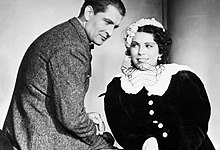
Stanisław Ignacy Witkiewicz, commonly known as Witkacy, was a Polish writer, painter, philosopher, theorist, playwright, novelist, and photographer active before World War I and during the interwar period.

Teddy Bear is the English title of Miś, a 1981 Polish comedy film directed by Stanisław Bareja. Teddy Bear, along with The Cruise(Rejs), was a reflection of contemporary Polish society using surreal humor to somehow get past the censorship at the time. It gained cult status in its native country. Later, the film was reappraised by critics and it has been regarded as one of the best Polish films ever made.

Aleksander Bożydar Żabczyński, was a Polish stage and movie actor, one of the most popular actors during the interwar period in Poland.

Song of the Flame is a 1930 American pre-Code musical film photographed entirely in Technicolor. Based on the 1925 operetta of the same name, the film features a screenplay by Gordon Rigby adapted from the musical book written by Oscar Hammerstein II and Otto A. Harbach for the operetta. The movies also features many of the songs from the operetta which used lyrics by Hammerstein and Orbach and music by George Gershwin and Herbert Stothart. The film was produced and distributed by First National Pictures. It was the first color film to feature a widescreen sequence, using a process called Vitascope, the trademark name for Warner Bros.' widescreen process. The film, based on the 1925 Broadway musical of the same name, was nominated for an Academy Award for Sound Recording. It is part of the tradition of operetta films, popular at the time.

Tadeusz Fijewski was a Polish stage and film actor. He appeared in 50 films between 1927 and 1978.
The Ashes is a 1965 Polish drama film directed by Andrzej Wajda, referencing the classic Stefan Żeromski epic novel of Polish Literature of the same name. It was entered into the 1966 Cannes Film Festival. It sold about 6 million tickets in Poland, becoming one of the highest-grossing Polish films of all time.
Stanisława Perzanowska was a Polish actress, theater and film director, professor at the National Higher School of Theatre in Warsaw.

Zofia Wanda Leśniowska was the daughter of Lieutenant-General Władysław Sikorski. She was a first lieutenant (porucznik) in the Polish Armed Forces. She died together with her father in the controversial 1943 Gibraltar B-24 crash.

Zofia Merle is a Polish character actress. She has made over 75 appearances in film and television. She starred in the 1978 comedy film What Will You Do When You Catch Me?.

Maria Bogda (1909–1981) was a Polish actress.

Stefania Górska (1907–1986) was a Polish stage and film actress, composer, singer, and dancer, born in Warsaw. She was married to actor Wacław Zadroziński.
Józef Lejtes (1901–1983) was a Polish screenwriter and film director. He later worked in Israel and the United States.

Kazimierz Junosza-Stępowski was a Polish stage and film actor. He was a legendary figure in Polish cinema who had appeared in the earliest Polish films in 1902. Junosza-Stępowski was killed while trying to protect his wife from members of the Polish Home Army, who had discovered she was an informer for the Gestapo.

Władysław Sikorski's death controversy revolves around the death of the commander-in-chief of the Polish Army and Prime Minister of the Polish government in exile, General Władysław Sikorski, in the 1943 B-24 crash in Gibraltar. Sikorski's Liberator II crashed off Gibraltar almost immediately after takeoff, with the plane's pilot being the only survivor. The catastrophe, while officially classified as an accident, has led to several conspiracy theories that persist to this day, and often propose that the crash was an assassination, which has variously been blamed on the Soviets, the British, and the Nazis. The incident is still described by some historians as mysterious and was investigated by the Polish Institute of National Remembrance. They concluded that the injuries sustained were consistent with a plane crash and that there was not enough evidence to support or reject the theory that the plane was deliberately sabotaged.

Mieczysław Cybulski was a Polish film actor. He appeared in more than 25 films between 1927 and 1939.

Zygmunt Chmielewski was a Polish film actor. He appeared in 35 films between 1921 and 1960.

Romuald Gierasieński was a Polish actor. He appeared in eleven films between 1920 and 1939.

Nora Ney was a Polish film actress of Jewish descent.















